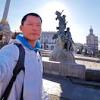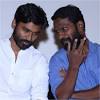‘We’re not afraid of Putin’: defiance on the streets of Kyiv

As protesters condemn Russian president, city’s defence chief says it is ready for ‘any situation’
- Ukraine crisis – live updates

The doors to the Russian embassy in Kyiv were shut on Tuesday. Seemingly nobody was at home. Outside on the street a small, noisy crowd of demonstrators waved blue and yellow Ukrainian flags. “We are not afraid of Vladimir Putin. Or his army,” said one activist, Roman Tyschenko.
Behind him protesters banged kettle drums and broke into a rhythmic chant of “Putin huiylo”, to blaring music from a loudspeaker. “It means Putin is a motherfucker,” Tyschenko explained. “It’s our anthem. Football fans in Kharkiv invented the song in 2014, when Russia stole Crimea.”
After a meeting with his security council on Monday in Moscow, Putin recognised the so-called breakaway republics of Donetsk and Luhansk as independent. In a long, and menacing speech he also asserted that Ukraine was not a state, but a historical mistake made by Lenin.
“Putin is insane, crazy,” Tyschenko said. “Ukraine is both a country and a state. We have ancient traditions. Kyiv was founded before Moscow. We have a much longer record of nationhood.”
The threat of war hangs over Kyiv, a city of 3 million people plus another million who commute daily from its suburbs. The US and UK governments believe Putin’s ambitions go beyond the Donbas region, whose separatist administrations Moscow has long armed and propped up.

They believe that Russia’s president is poised to attack and encircle the Ukrainian capital, sending in tanks and troops currently parked two hours’ drive away, just across the border in Belarus. The talk among intelligence professionals is of Baghdad-style shock and awe. His goal: to subjugate Ukraine.
And yet so far Kyiv residents have reacted to the situation with an collective weapon: carrying on as normal. Cafes and restaurants were open on Tuesday, mothers pushed their toddlers through parks bathed in spring sunshine, and cyclists bumped over cobbled streets.
A few more flags were visible than usual, attached to cars and adorned with the slogan: “Believe in Ukraine.” Otherwise there was no hint that the country might soon be at war, or that Kyiv could find itself occupied by a foreign army.
“We will defend our country,” one activist, Serhiy Ikonnikov, said, standing outside the Russian embassy, a grey neo-classical building topped with razor wire. He added: “In the history of war there is the question of motivation. The Russian army doesn’t have it. We do. We will defend our country, our homes and our families. If Putin invades, lots of Russian blood will be spilled.”
Was he afraid? “A bit. Not for myself but for my relatives,” he said. Next to him, protesters held signs saying: “Donbas is Ukrainian”; “We will never retreat”; and “Evil empire”.
Ikonnikov, 23, added: “There’s also some kind of excitement. If Putin invades us it will be the end of Russia. It will be the start of a wonderful new Europe, and of Ukraine as a member of that Europe.”
In another part of Kyiv, with a picturesque glass bridge spanning the turquoise Dnipro river, friends and couples posed for photos. Sitting on a bench, Denis Astapenko said Russia was trying to spook Ukrainians with a disinformation campaign. “There are a lot of rumours,” he said. “For myself I’m calm.”
Astapenko, a wedding photographer, said he had done portraits of a couple who got married in Kyiv on Tuesday morning. His order book was full, he said, with further shoots lined up for later this week. A favourite wedding shot location was the bridge, with its panoramic views, he added.
In the nearby Volodymyrska Girka park a statue of Vladimir the Great looked out over the embattled capital. It was Vladimir who converted Kyivan Rus’ (alternative spelling: Kievan Rus’) – a princely state founded in Kyiv in the 10th century – to Christianity. At the time Moscow didn’t exist, Astapenko noted.
Olga Machevska, a retired librarian, said Putin’s view of Ukraine’s history was entirely wrong and stupid. “He needs to go back to the archive,” she said. “We had Kyivan Rus’. In the 11th century we built St Sophia’s cathedral. In Moscow there was nothing: just woods.”

Over at the city hall, a grandiose building on Kyiv’s main Khreshchatyk boulevard, done in postwar Stalinist style, the head of civil defence, Roman Tkachuk, said there was no reason to panic. “We are ready for any emergency situation,” he said. “We are highly prepared.”
Tkachuk said Kyiv now had a network of 5,000 bomb shelters including 47 Soviet-era metro stations, dug deep underground. There was enough space for the city’s residents, he said, with purpose-built basements in hospitals, bread factories and other critical facilities.
Ukraine’s president, Volodymyr Zelenskiy, has so far taken no obvious steps to fortify Kyiv from Russian military attack. He has previously berated the US and UK for moving their embassies out of the capital, and relocating them to Lviv, close to the Polish border, in the west of the country.
Was Zelenskiy’s optimism that nothing would befall Kyiv a mistake? “If I give an order to put sandbags outside government buildings or to tape up windows that will cause concern,” Tkachuk said, adding there were plans in place if evacuation became necessary, with the city authorities ready to help the old and infirm.
One fear is that Russian combat planes may seek to knock out mobile phone and internet services, as well as electricity and power, leaving a terrified population in the cold and dark. Tkachuk said there were plans to send police cars with megaphones round the streets, in order to deliver public order messages, if TV stations went down.
“I will be the last person to leave the city,” he said. “My family lives here, my mother lives here. I’m not going anywhere.”
- Ukraine
- Vladimir Putin
- Russia
- Europe
- features


 Malaysia
Malaysia Argentina
Argentina  Australia
Australia  Austria
Austria  Brazil
Brazil  Canada
Canada  Germany
Germany  Ireland
Ireland  Italy
Italy  Mexico
Mexico  New Zealand
New Zealand  Poland
Poland  South Africa
South Africa  United Kingdom
United Kingdom  United States
United States 


















